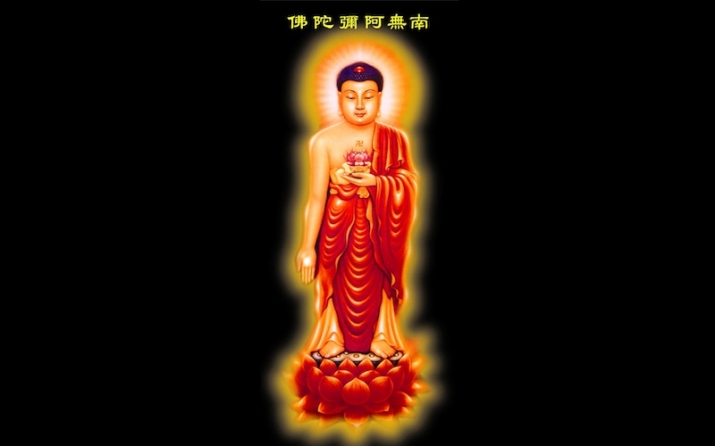FEATURES|COLUMNS|Teachings of Amitabha
Master Shandao’s Exegesis on the Deep Mind, Part One: Determinant Deep Faith Concerning Aptitude
 From Namo Amitabha Wallpapers
From Namo Amitabha WallpapersAfter his exegesis on the Sincere Mind, Master Shandao set forth to explain the meaning of the Deep Mind. The Deep Mind is the second of the Threefold State of Mind mentioned in the Contemplation Sutra. It is the longest passage among the three: the Sincere Mind, the Deep Mind, and the Mind of Merit-dedication and Rebirth-aspiration.
In this section, Master Shandao outlined the seven kinds of determinant faith, which are specific and easy to follow. They are called “determinant” because possession of them means that the aspirant has resolved, at the spiritual crossroads, to place faith in Amitabha Buddha’s teaching of deliverance, rather than a personal belief to know.
The seven kinds of determinant deep faith are as follows:
1. Determinant deep faith in the aptitude of sentient beings
2. Determinant deep faith in Amitabha’s vows of deliverance as stated in the Infinite Life Sutra
3. Determinant deep faith in Shakyamuni’s teaching as stated in the Contemplation Sutra
4. Determinant deep faith in the exhortation given by all Buddhas in the Ten Directions as stated in the Amitabha Sutra
5. Deep faith in the context of persons (the Buddha)—believing in the Buddhas’ words alone
6. Deep faith in the context of persons (the Buddha)—believing that it is not mistaken or fraudulent to follow a fully enlightened person
7. Deep faith in the context of persons (the Buddha)—believing that faith in the Buddha and his words means that one does not retrogress under any spiritual circumstance
Two main kinds of Deep Faith
Master Shandao writes: Secondly, the Deep Mind. “Deep Mind” is the mind of deep faith. There are also two kinds.
The first kind of determinant deep faith: We are iniquitous, ordinary beings subject to endless rebirth. Since time immemorial, we have died and been reincarnated, without any causal conditions to leave the cycle of rebirth.
The second kind of determinant deep faith: Amitabha Buddha embraces and receives all sentient beings with his 48 vows. Free from doubt and anxiety, we are assured of rebirth [in the Pure Land] with recourse to the power of his vows.
These two kinds of Deep Mind are interrelated and inseparable, just like the two sides of a coin. The first kind of deep faith is known as “determinant deep faith in aptitude [and capacity], spoken from the perspective of sentient beings,” and the second is known as “determinant deep faith in the teaching [of deliverance],” spoken from the perspective of Amitabha Buddha.
There is perfect coherence between these two, just as there must be coherence between the existence of a disease for the cure to be realized and medicine. There is a Buddhist saying: “While all medicines have an effect, the one that actually cures your sickness is best. While all Buddhist teachings lead to liberation, the one that actually suits your aptitude is best.”
The first kind of deep faith involves renouncing all self-powered practices on one hand, and entrusting one’s deliverance to other-power on the other. This is the meaning of faith in Pure Land Buddhism, which differs from all other Buddhist teachings.
 From Flickr
From FlickrDeeply believe that we are iniquitous sentient beings
The first kind of determinant deep faith reflects the explication of the first in the Threefold State of Mind—the Sincere Mind—and is also the entry point for establishing deep faith in Pure Land Buddhism. “Determinant deep faith in aptitude” is a peculiar and unique kind of faith in Pure Land Buddhism. An aspirant must sincerely reflect: “Who am I?”
1. We must sincerely concede that our status, from time immemorial, has been that of sentient beings trapped in the Three Domains and Six Realms
2. At present, we are iniquitous sentient beings
3. We have been born, died and reborn in countless past lives
4. In the future, we will certainly lack the causal conditions to leave the cycle of rebirth through our own power
This is the pitiful reality. In the eye of the Buddha, all sentient beings are now in the same boat. No matter our station of birth, intelligence, wisdom and resolve, all of us, in the Dharma-ending Age, lack the causal conditions to leave the cycle of rebirth. Causal conditions refer to conditions that promote self-powered spiritual cultivation and merit-accumulation through the meditative or non-meditative virtues.
Causal conditions also refer to the act of dedicating these merits and virtues in aspiration to rebirth in the Land of Bliss—even with the assistance (Sanskrit: adhisthāna)—blessing, empowerment, or spiritual support) of Amitabha Buddha. This is the main point of the first kind of determinant deep faith: we are powerless to emancipate ourselves.
Some aspirants think that they can understand and practice the self-power stream of Pure Land Buddhist teachings. In so doing, they do not follow the Buddha’s advice on the best method of attaining rebirth in the Land of Bliss. By mustering enough resolve, they believe they can “create” a causal condition that allows them to attain rebirth through their own power. Put bluntly, this is a misguided and arrogant presumption.
The Infinite Life Sutra states, “Such a person humbly and respectfully hears, follows and upholds it [the Dharma], and rejoices so greatly as to dance. Arrogant, corrupt and indolent people cannot readily accept this teaching.” Here, “this teaching” refers to deliverance through the vow power of Amitabha Buddha, and the practice of exclusively reciting his name.
Why is it necessary to be humble and respectful in practicing this teaching?
Master Huijing of the Pure Land school’s Shandao lineage has commented before on the Infinite Life Sutra’s statement. He teaches that the determinant deep faith in aptitude is very difficult for ordinary beings to accept. Sentient beings would have to have encountered countless Buddhas—“as many as the Ganges’ sands”—in their past lives, set forth the Bodhi Mind, and practiced self-power teachings to attain liberation.
But even with the tutelage of countless past Buddhas, we beings of the Dharma-ending Age have failed to attain enlightenment. Such is the depth of our karmic evil. Because of this, no one should ever brag of their spiritual “attainments.” Even those who are diligent in self-power practice are all just ordinary, iniquitous beings. Nevertheless, it is still profoundly difficult for us to discard the mind of self-power, or to believe in and rely entirely upon other-power.
Thankfully, Master Shandao showed us the way out of this predicament. The two kinds of deep faith are called “determinant” because possessing them means that the aspirant has resolved, at their spiritual crossroads, to place faith in Amitabha Buddha’s vow of deliverance, and to give up all other self-powered Buddhist teachings.














